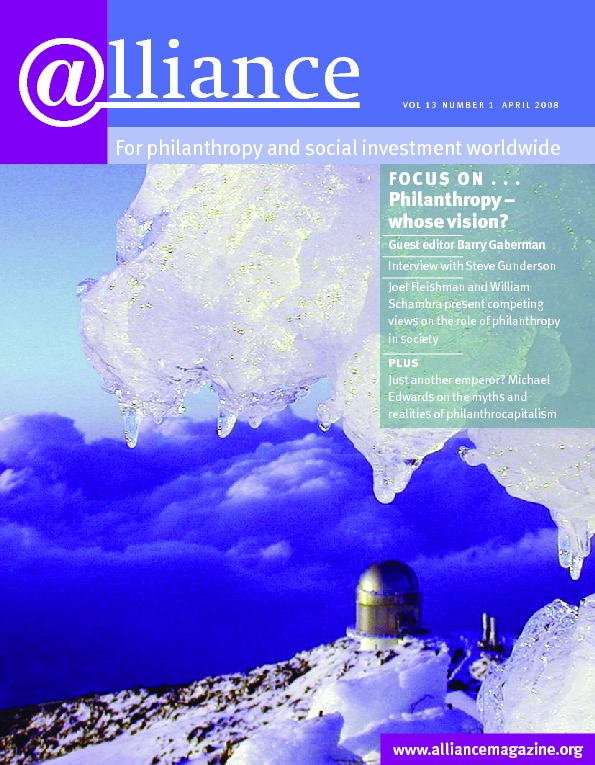Joel Orosz’s theme, foundation management, is, for some people, a strange one. How can giving money away be complicated? Why should it need to be managed? In more innocent days, worthy people were simply identified by the benefactor and put in charge. Here in the UK, they tended to be ex-ambassadors and former senior soldiers; men (and they were almost always men) who ‘knew how to run things’, felt that they were ‘putting something back’ after their exciting and often very privileged professional lives, and were not exactly paralysed by self-doubt.
As younger people with more activist backgrounds began to work in foundations, they began to see them as resources to be managed. They worried about how best to do it and some were competitive in their desire to do it better than others. And now there are whole books about it.
I started out wanting to dislike this one. The notion that there were only 14 challenges, and that ways to beat them could be so easily summarized, seemed like an insult to my long years of working in the foundation scene. And when, in the Introduction, I read that ‘This book can be attacked in two different ways’, I thought, ‘Well, I’m sure I can find a few more ways than that…’ I was, however, wrong.
Despite the title, Orosz sets out just seven challenges and a further seven dilemmas of managing foundations. He identifies critical issues with which many of us have been grappling here in the UK, such as the lack of ideological cohesion between board and staff, and within staff (I’d have added ‘within boards’, especially where the trustee ‘gene pool’ has been – potentially unhealthily – limited to descendants of the founder). The dilemmas include whether to focus on a specific field of work and aim to have a high impact in it or to work more broadly, accepting that impact will therefore be shallower.
I have a sense, however, that the structure Orosz has chosen for the book forces him to pose some issues – and this is one of them – as dilemmas while his own view is fairly clear. In this instance, I read him as arguing for a tight focus, albeit tempered by a sense of realism and humility about the impact that any single organization can expect to have on major social issues. Similarly, his ‘dilemma’ of ‘high overhead versus low overhead’ reads as a plea for foundation leaders to recognize that a realistic(ally high) level of overheads is essential if foundations are to fulfil their potential for impact. The chapter called ‘high profile versus low profile’ is actually an argument for the former, sensitively handled.
These, though, are small quibbles. While few of the issues on which he focuses are new, he manages to address them in a way that is both profound and accessible. Take, for example, the following extract, about the challenge which results from the absence of a salutary external discipline on foundations:
‘Since foundations are undisciplined by the market, electorate, or funders, their only impetus for improvement comes from their (generally) self-perpetuating board of trustees. If you are a foundation leader, your imperative thus is a simple one: keep the board happy, and you will keep your job. So, what makes a board happy? The answer is easy: pride-inducing success. What makes a board unhappy? The answer is equally easy: embarrassing failure. What does this mean for the CEO? As a practical matter, the answer to this question is also very simple: since any kind of success is preferable to any kind of failure, since embarrassing the board members is to be avoided at all costs, it is critically important that every project be a success. What is the best way to ensure that every project will be a success? The key to perpetual success is to keep every project uncomplicated and modest in its ambition. Thus, inexorably, in order to keep their boards happy, in order to assure that embarrassment never darkens the trustees’ doorsteps, CEOs tend to seek the cautious and incremental success. Paradoxically, the societal organization given the most freedom to act hobbles itself; it is as if a superb French chef, capable of creating any gastronomic delight, insisted on making nothing except the blandest of oatmeal.’
What a pithy, and entertaining, summary of an all too common, but rarely described, phenomenon.
After reading this book, I contacted Peter Grant who runs a Master’s Course on Grantmaking Management at London’s Cass Business School to urge him to include it on the course reading list, alongside the homegrown oeuvres of Leat, Unwin et al; I am delighted to report that he was ahead of me and had already done so. Peter’s initiative should be copied by all those responsible for training and ‘growing’ new grantmakers.
Steven Burkeman is a consultant working mainly with foundations and human rights NGOs, and former Secretary of the Joseph Rowntree Charitable Trust. Email burkeman@gn.apc.org
Effective Foundation Management: 14 challenges of philanthropic leadership – and how to outfox them
Joel J Orosz AltaMira Press $22.95 (paperback)
ISBN 0759109877
Joel J Orosz AltaMira Press $22.95 (paperback)
ISBN 0759109877
To order
http://www.altamirapress.com



Comments (0)